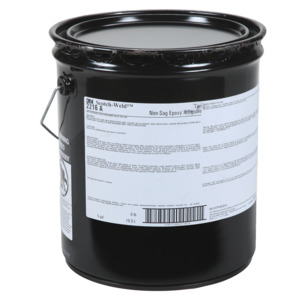
- Description
- Specifications
- Documents
- Non-sag properties provides greater bond line control than other non-sag epoxies
- Very flexible bond is resistant to extreme shock, vibration and flexing, making it ideal for potting and applications in the transportation industries
- Maintains a strong bond under expansion, contraction, and limited movement while retaining good strength after environmental aging
- Excellent for cryogenic bonding applications or adhering substrates that will be exposed to extreme cold
- Medium viscosity help minimize running, dripping, or migration while also self-leveling
- Versatile bonding agent will adhered a wide variety of similar and dissimilar substrates, including metals and masonry
- Can be heat cured to reduce curing times from 7 days to as a little as 30 minutes
3M™ Scotch-Weld Epoxy Adhesive 2216NS is a flexible, non-sag, two-part epoxy adhesive that cures at room temperature. It provides a high strength bond with both high shear and peel strength while remaining highly flexible, making it ideal for applications where vibration and thermal expansion and contraction are common. It also withstands very cold temperatures without becoming brittle.
When using a Duo-Pak (DP) size adhesive, rely on 3M dispensing equipment for convenient and accurate metering, mixing and dispensing.
Non-Sag Properties Provides Greater Bond Line Control
3M™ Scotch-Weld Epoxy Adhesive 2216NS is a non-sag version of our 3M™ Scotch-Weld Epoxy Adhesive 2216. It is designed for applications where high performance and flexible bonds are required. Its flexibility makes it ideal for applications involving dissimilar surfaces and where differing coefficients of thermal expansion are a consideration. Once fully cured the epoxy maintains an extremely strong bond under expansion, contraction and limited movement while also maintaining a good retention of strength over time and after environmental aging. With a 2:3 mix ratio it is a low viscosity epoxy. It flows smoothly for accurate dispensing. Both the base and accelerator are coded in contrasting colors to ensure you know which half of the product you are using.
Recommended Applications
- Hard disk drive component assembly
- Potting where expansion and thermal changes may occur, such as solar panels and other construction applications
- Military bonding applications, for example bonding parts on movable transports
- Bonding ceramic, most plastics and glass to metal
- Attaching various substrates to masonry and stone
- Excellent for Cryogenic Bonding Applications
Our 3M™ Scotch-Weld Epoxy Adhesive 2216NS is designed to perform under extremely frigid temperatures. Because it can withstand temperatures up to -423°F/-252°C it is ideal for cryogenic bonding applications. At room temperature it offers a 90 minute work life to allow for repositioning and adjustments. It will slowly cure over 7 days, but can be heat cured to reduce this to as little as 30 minutes (at 200°F/93°C.) It has a bonded shear strength that can withstand up to 3,200 psi at 72°F/24°C.
Understanding Epoxy Adhesives
Epoxy adhesives, including 5 minute epoxy are part of the class of adhesives called "structural adhesives," which include polyurethane, acrylic, cyanoacrylate and others. Epoxies are formulated as liquid rea¬ctive polymers that undergo a chemical reaction when mixed and then cure to form a solid plastic material. Once the two parts are mixed in their specified ratio, they begin the curing process and offer a limited working time where the adhesive can be applied and the two surfaces positioned as needed. This work life lasts anywhere from a few minutes to several hours. These structural adhesives provide high shear and peel strengths, depending on the formula, and better heat and chemical resistance than other common adhesives. In general, epoxy adhesives have the highest overall strength and offer the best performance and most resistance to high temperatures, solvents and outdoor weathering.
Epoxy adhesive (often referred to as epoxy glue) is widely used in building and home construction; aircraft and automobile manufacturing; bicycle, boat, golf clubs, ski and snowboard assembly as well as a host of home use and other applications. It is used virtually anywhere high-strength bonds are needed along with resistance to environmental conditions. These adhesives are popular for their ease of use, mechanical strength and chemical resistance. Formulations can be created to make epoxy for plastic flexible or epoxy for metal rigid, epoxy resin transparent or opaque, quick setting or slow setting. The versatility with which these adhesives can be formulated helps meet almost any requirement for bonding wood, metal, glass, stone an
